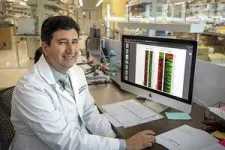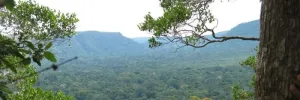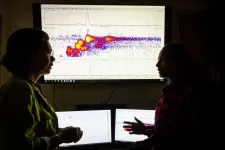(Press-News.org) “Fight-or-flight” is not an option for plants, unfortunately, when it comes to pathogen attacks. Instead, plants opt for “do-or-die.” A deeper insight into the genetic mechanisms that enable plants to resist pathogen infections has equipped researchers with tools to tackle the most devastating pathogens in agriculture. Using advanced RNA sequencing, researchers have recently uncovered how varieties of soybean respond to different types of soybean cyst nematodes (SCNs), with potential implications for developing more resilient crops and reducing reliance on chemical treatments.
Published in Molecular Plant-Microbe Interactions (MPMI), the study led by Mst Shamira Sultana, from the Hewezi Lab at the University of Tennessee, revealed new insights into the genetic mechanisms that enable soybean plants to resist infection by SCN. The study explored how both resistant and susceptible soybean varieties react at the genetic level when exposed to SCN. The researchers investigated the alterations in gene expression in soybean roots during SCN infection. The results revealed that resistant plants ramp up the activation of genes involved in immune responses, effectively protecting them from damage. In contrast, susceptible plants failed to activate these critical defense genes, leaving them vulnerable to nematode attack. Interestingly, this research also highlighted that certain genes are regulated in opposite ways depending on the plant’s resistance status, offering new insights into how plants distinguish and respond to different types of nematode threats.
By manipulating specific genes that render plants susceptible or resistant to pests, researchers aimed to enhance resistance in otherwise vulnerable plants. An exciting part of this research is revealing how soybean varieties have different genetic responses to various types of soybean cyst nematodes. “We’re excited to uncover how different soybean lines have distinct genetic responses to these microscopic pests,” said Tarek Hewezi. He added, “This research not only enhances our understanding of plant defense mechanisms but also opens up new possibilities for breeding soybeans that are naturally more resistant to nematode infections.”
The impacts of this study are far reaching. SCNs cause billions of dollars in crop losses worldwide each year, threatening food security and progress toward sustainable agriculture. By focusing on the genes that control resistance, scientists can work to breed soybeans that naturally resist nematodes, reducing the need for chemical pesticides. “This knowledge is essential for developing more resilient crops and minimizing the need for chemical pesticides, ultimately promoting more sustainable agricultural practices,” said Hewezi. This research marks a major step forward in understanding plant defenses and has the potential to revolutionize soybean breeding.
For additional details, read “Differential Transcriptome Reprogramming Induced by the Soybean Cyst Nematode Type 0 and Type 1.2.5.7 During Resistant and Susceptible Interactions,” published in MPMI.
Follow the authors on LinkedIn
Mst Shamira Sultana: https://www.linkedin.com/in/mst-shamira-sultana-phd-895533158/
About Molecular Plant-Microbe Interactions (MPMI)
Molecular Plant-Microbe Interactions® (MPMI) is a gold open access journal that publishes fundamental and advanced applied research on the genetics, genomics, molecular biology, biochemistry, and biophysics of pathological, symbiotic, and associative interactions of microbes, insects, nematodes, or parasitic plants with plants.
Follow MPMI on X and Bluesky and visit https://apsjournals.apsnet.org/journal/mpmi to learn more.
END
Rooting for resistance: How soybeans tackle nematode invaders is no secret anymore
2025-01-23
ELSE PRESS RELEASES FROM THIS DATE:
Beer helps grocery stores tap sales in other categories
2025-01-23
ITHACA, N.Y. – When a grocery store starts selling beer, its sales grow beyond just six-packs and cases: Households, and beer-purchasing households in particular, visit the store more frequently and increase their total monthly grocery expenditures, according to new Cornell research.
The finding has important implications for the intensely competitive grocery business, which operates on razor-thin profit margins between 1 and 3%, well below other retail sectors. One approach to boosting profits is employing “loss leaders,” specific products sold below cost to attract customers to a store and encourage them to buy other, more profitable ...
New USF study: Surprisingly, pulmonary fibrosis patients with COVID-19 improve
2025-01-23
Key takeaways:
Pulmonary fibrosis in patients with COVID-19 tends to resolve, while idiopathic pulmonary fibrosis always progresses
Scientists believe key immune elements – cells and genes – may explain resolution versus progression of the disease
“Both diseases are caused by injury to alveolar epithelial cells in the lungs. In the case of COVID-19, the injury is viral and acute and in the case of IPF, the injury is unknown but repetitive and chronic — so that may explain the different patterns of pulmonary fibrosis progression.’’
TAMPA, Fla. (Jan. 23, 2025) ...
In a landmark study, an NYBG scientist and colleagues find that reforestation stands out among plant-based climate-mitigation strategies as most beneficial for wildlife biodiversity
2025-01-23
Bronx, NY—In the global effort to combat climate change, large-scale, plant-based strategies such as planting forests and cultivating biofuels are an increasingly important part of countries’ plans to reduce their overall carbon emissions, but a landmark new study in the journal Science finds that well-intended strategies could have unforeseen impacts on biodiversity and that, in general, restoring forests has the most beneficial effect on wildlife.
The authors, including New York Botanical Garden (NYBG) Assistant Curator Evelyn Beaury, Ph.D., argue that policy makers and conservation officials should consider impacts on biodiversity when evaluating the ...
RSClin® Tool N+ gives more accurate estimates of recurrence risk and individual chemotherapy benefit in node-positive breast cancer
2025-01-23
A new statistical tool that combines multiple clinical and pathologic factors with a patient's 21-gene Oncotype DX Breast Recurrence Score® result provides more accurate estimates about that patient’s breast cancer prognosis and their potential benefit from chemotherapy than either the Recurrence Score® result or clinical factors alone.
The tool could be used in counseling patients with hormone receptor-positive (HR+), HER2-negative breast cancer that has spread to the lymph nodes, and could improve shared decision-making ...
Terahertz pulses induce chirality in a non-chiral crystal
2025-01-23
Chirality refers to objects that cannot be superimposed to their mirror images through any combination of rotations or translations, much like the distinct left and right hands of a human. In chiral crystals, the spatial arrangement of atoms confers a specific "handedness", which, for example, influences their optical and electrical properties.
The Hamburg-Oxford team focused on so-called antiferro-chirals, a type of non-chiral crystals reminiscent of antiferro-magnetic materials, in which magnetic ...
AI judged to be more compassionate than expert crisis responders: Study
2025-01-23
By definition, robots can’t feel empathy — it requires being able to relate to another person’s human experience, to put yourself in their shoes.
But according to new U of T Scarborough research, artificial intelligence (AI) can create empathetic responses more reliably and consistently than humans, even when compared to professionals whose job relies on empathizing with those in need.
“AI doesn’t get tired,” says Dariya Ovsyannikova (HBSc 2023 UTSC), lab manager in Professor Michael Inzlicht’s lab at U of T Scarborough ...
Scale-up fabrication of perovskite quantum dots
2025-01-23
Quantum dots are tiny semiconductor nano materials with color-tunable and high-efficiency photoluminescence, which have been successfully applied in different display technology such as liquid crystal displays (LCDs), organic light-emitting diodes (OLEDs), and micro light-emitting diodes (Micro-LEDs). In 2023, the Nobel Prize in Chemistry rewards the discovery and development of quantum dots. Perovskite quantum dots (PQDs) are emerging display materials with high absorption coefficient, low cost and easy processability, and less environmental impact. ...
Adverse childhood experiences influence potentially dangerous firearm-related behavior in adulthood
2025-01-23
Researchers at Rutgers University have found that adverse childhood experiences can make people more sensitive to potential threats from others, which in turn increases their risk of engaging in defensive gun use in adulthood.
Their study, published in the Journal of Psychiatric Research, used cross-sectional data from a subsample of 3,130 adults with firearm access drawn from a nationally representative sample of U.S. adults.
Those surveyed were asked about their childhood experiences with abuse and neglect, their levels of social distrust and sensitivity to perceived threats, depressive symptoms and their self-reported use of a gun for self-defense.
The authors first assessed the association ...
Bacteria found to eat forever chemicals — and even some of their toxic byproducts
2025-01-23
BUFFALO, N.Y. — In the quest to take the “forever” out of “forever chemicals,” bacteria might be our ally.
Most remediation of per- and polyfluoroalkyl substances (PFAS) involves adsorbing and trapping them, but certain microbes can actually break apart the strong chemical bonds that allow these chemicals to persist for so long in the environment.
Now, a University at Buffalo-led team has identified a strain of bacteria that can break down and transform at least three types of PFAS, and, perhaps even more crucially, some of ...
London cabbies’ planning strategies could help inform future of AI
2025-01-23
Researchers have measured the thinking time of London taxi drivers - famous for their knowledge of more than 26,000 streets across the city - as part of a study into the future of AI route-mapping.
Unlike a satnav, which calculates every possible route until it gets to the destination, researchers at the University of York, in collaboration with University College London and the Champalimaud Foundation, found that London taxi drivers rationally plan each route by prioritising the most challenging areas first and filling in the rest of the route around these tricky points.
Current computational models to understand ...







